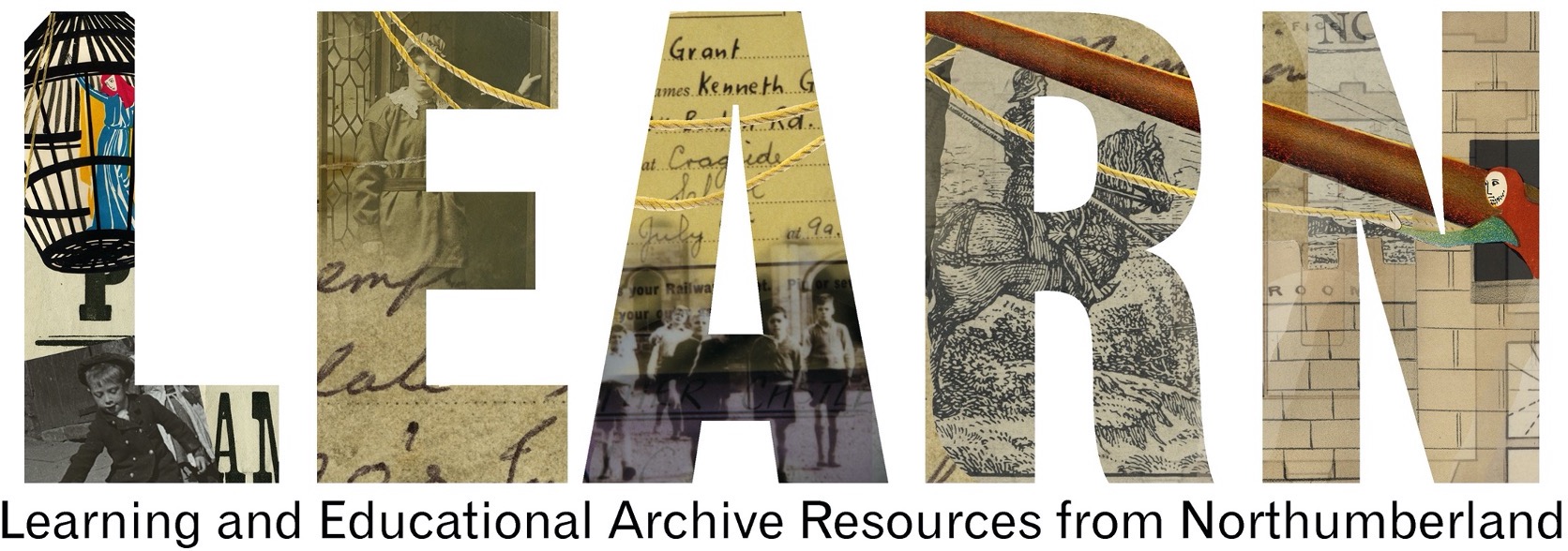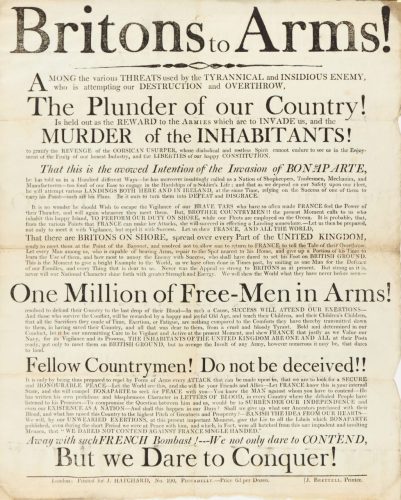Britons to Arms Poster, About 1803
Reference: ZCE/F/4/3/1
Suggested age groups: KS2, KS3, KS4, KS5, Lifelong Learners
Subject areas: History, Literacy, Art, Geography
CONTEXT
Napoleon Bonaparte (Napoleon I) was a French military general who became the first Emperor of France in 1804 as a result of the French Revolution.
In 1802 Britain and France signed the Treaty of Amiens. This brought to an end the French Revolutionary Wars (1792-1802), a series of conflicts across Europe that France fought against Britain and other European states. Peace was short-lived.
The Napoleonic Wars were a series of major global conflicts pitting the Napoleonic French Empire and its allies against an array of European states formed into various coalitions. The conflicts were a consequence of unresolved disputes resulting from the French Revolution and French Revolutionary Wars.
The Napoleonic Wars are often categorised into five periods: the Third Coalition (1805), the Fourth Coalition (1806-07), the Fifth Coalition (1809), the Sixth Coalition (1813-14), and the Seventh Coalition (1815).
The Wars conclude with the Battle of Waterloo and Napoleon’s second abdication on 22nd June 1815.
In 1803 Britain declared war on France. Napoleon responded by assembling an invasion fleet against Britain. This poster is a call to arms and a declaration for British men to defend their country against the French. The poster shows us how fearful Britain was of a French invasion, and their will to fight back by claiming that one million men were ready to take up arms. The population of Britain in 1801 was 10.5 million people.
The poster references two alleged insults against the British made by Napoleon – that Britain was a nation of shopkeepers and that the British were ‘too fond of our Ease to engage in the Hardship’s of a Soldier’s Life…’. The reference to shopkeepers suggested that Britain was a commercial nation rather than a military one. Britain’s military power at this time lay with the Royal Navy. During the periods of the French Revolutionary Wars (1793-1802) and the Napoleonic Wars (1803-1815) the power of the Royal Navy was at its height and exceeded that of other European nations.
The poster refers to Napoleon as the Corsican usurper – Napoleon was born in Corsica in 1769. This is an attack upon Napoleon personally rather than the French as a nation.
The production of posters and handbills was an important method of circulating information in the 18th and 19th centuries. Newspapers were expensive and taxed by the government. Posters, public notes, and handbills could be produced and circulated cheaply and were therefore an effective form of communication.
Tar – the term Tar or Jack Tar was used to describe a sailor. The term is thought to derive from the fact that tar was used by sailors to pitch or waterproof the ship.
ACTIVITIES
ACTIVITY 1
Background
In 1802 Britain and France signed the Treaty of Amiens. This brought to an end the French Revolutionary Wars (1792-1802), a series of conflicts across Europe that France fought against Britain and other European states.
SEE
See: What was the Treaty of Amiens?
See: Which conflict ended as a result of the Treaty of Amiens?
See: Who was Napoleon Bonaparte?
See: What were the Napoleonic Wars?
See: Which countries were involved in the Napoleonic Wars?
See: Which periods are the Napoleonic Wars broken into?
See: When did the Napoleonic Wars end?
THINK
Think: How did Napoleon become Emperor of France?
Think: What was the social, political and economic state of France in 1803?
Think: What was the social, political and economic state of Britain in 1803?
Think: Why did Britain fear a French invasion?
Think: Did France invade Britain?
Think: Who won the Napoleonic Wars?
DO
Do: Discuss how was the political structure in France in 1801 was different to the political structure in France before the French Revolution?
Do: Discuss how the French Revolution was a cause of the Napoleonic Wars.
Do: Create a timeline showing the events that led up to Britain declaring war on France in 1803.
Do: Create a table showing the outcomes and impacts the Treaty of Amiens had for both Britain and France.
Do: Add to your table to show how the Treaty of Amiens either benefitted or disadvantaged France and Britain.
Do: Debate whether it was right or wrong for Britain to declare war on France so soon after the Treaty of Amiens.
Do: Create a timeline of the key events of the Napoleonic Wars. Make note of the different coalitions over time.
Do: Create a map showing which countries fought on which sides of the Napoleonic Wars.
Do: Create a profile showing the key leaders from each country involved in the Napoleonic Wars.
Do: Compare Europe in 1803 to Europe in at the end of the Napoleonic Wars. What were the consequences of the war for different European nations?
Resources
ACTIVITY 2
Background
In 1803 Britain declared war on France. Napoleon responded by assembling an invasion fleet against Britain. This poster is a call to arms and a declaration for British men to defend their country against the French. The poster shows us how fearful Britain was of a French invasion, and their will to fight back by claiming that one million men were ready to take up arms. The population of Britain in 1801 was 10.5 million people.
SEE
See: What is this document?
See: When was this document created?
See: What is the purpose of this document?
See: Who is the poster an attack against?
See: Which two alleged insults against the British does the poster reference?
THINK
Think: What is propaganda?
Think: Why is propaganda used?
Think: When is propaganda used?
Think: Is this document an example of propaganda?
Think: Who is the target audience of this document?
Think: Is propaganda factual?
Think: Is propaganda a reliable source?
Think: Is propaganda today different to propaganda in 1803?
Think: How is propaganda spread today?
DO
Do: Read through the poster. Highlight and annotate the linguistic choices and literary devices used in the text.
Do: Analyse and discuss the impact that the linguistic choices and literary devices have on the audience.
Do: Think about the key message of the poster. In one sentence write down what the poster is trying to tell the audience.
Do: Research and fact check the statements made in the poster.
Do: Highlight the sections of the poster that express a fact.
Do: Highlight the sections of the poster that express an opinion.
Do: Discuss what we can learn about Britain’s attitude toward France at this time from the poster.
Do: Discuss what we can learn about France’s attitude toward Britain at this time from the poster.
Do: Find other examples of anti-Napoleon propaganda.
Do: Find examples of pro-Napoleon propaganda used within the French Empire.
Do: Discuss how Napoleon used the arts as a form of propaganda.
Do: Find examples of anti-British propaganda used by France and Napoleon.
Do: In groups, debate which side of the Napoleonic Wars had the most successful use of propaganda.
Do: Create your own propaganda poster.
Do: Compare propaganda from both sides of the Napoleonic Wars. Are they similar or different? What can be learned from them?
Do: Think about current world events. Make a note of any propaganda you might have seen recently.
Do: Find an example of present-day propaganda. Compare it to propaganda from the Napoleonic Wars. What is similar and what is different?
Do: Imagine you were going to create propaganda today. Plan how you would present and circulate it. Is this different from how propaganda was circulated in 1803?
Resources
https://www.thenapoleonicwars.net/return-of-war-1803-overview
https://www.ngv.vic.gov.au/napoleon/art-and-design/propaganda.html
https://www.theparisreview.org/blog/2018/02/26/napoleons-chamber-pot-propaganda-fake-news/
https://www.warhistoryonline.com/instant-articles/napoleon-won-the-propaganda.html?chrome=1
OTHER ONLINE RESOURCES
Napoleon Bonaparte
Britannica page on Napoleon Bonaparte: https://www.britannica.com/biography/Napoleon-I
BBC History page on Napoleon Bonaparte: https://www.bbc.co.uk/history/historic_figures/bonaparte_napoleon.shtml?basic=1
History page on Napoleon Bonaparte: https://www.history.com/topics/france/napoleon
Napoleonic Wars
Britannica page on the Napoleonic Wars: https://www.britannica.com/event/Napoleonic-Wars
History of War article on the Napoleonic Wars: http://www.historyofwar.org/articles/wars_napoleonic.html
National Army Museum page on the Napoleonic Wars: https://www.nam.ac.uk/subjects/napoleonic-wars
National Archives research guide on the Napoleonic Wars: https://www.nationalarchives.gov.uk/help-with-your-research/research-guides/napoleonic-wars/
Treaty of Amiens
Text of the Treaty of Amiens: https://www.napoleon-series.org/research/government/diplomatic/c_amiens.html
Overview of the Treaty of Amiens: https://www.thenapoleonicwars.net/peace-of-amiens-overview
History Today article om the Treaty of Amiens: https://www.historytoday.com/archive/months-past/treaty-amiens
Britannica page on the Treaty of Amiens: https://www.britannica.com/event/Napoleonic-Wars/The-Treaty-of-Amiens


